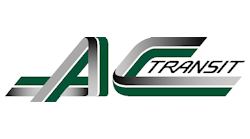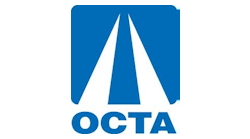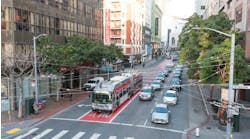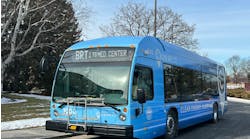The Center for Transportation and the Enviroment (CTE) has announced that it is in the beginning stages of implementing the Fuel Cell Electric Bus Commercialization Consortium (FCEBCC), a large-scale project that will result in the deployment of 20 zero-emission hydrogen fuel cell electric buses at two transit agencies in California.
The project is sponsored by a $22.3 million grant from the California Air Resources Board (CARB) through California Climate Investments, a statewide program that puts billions of cap-and-trade dollars to work reducing greenhouse gas emissions, strengthening the economy and improving public health and the environment — particularly in disadvantaged communities. Additionally, both the Bay Area Air Quality Management District (BAAQMD) and the South Coast Air Quality Management District are providing $1 million grants.
New Flyer will produce the buses in conjunction with Ballard Power Systems as the fuel cell power plant provider. Two of the largest transit agencies in California — Alameda Contra-Costa Transit District (AC Transit) and the Orange County Transportation Authority (OCTA) — will each deploy ten buses. The buses are to be supported by advanced fueling infrastructure provided by The Linde Group.
The project will build zero-emission buses that are able to replace conventional internal combustion engine buses one for one. Fuel cell electric buses match conventional buses in range, speed of fueling, and flexible deployment on almost every route, including steep hills and freeways, while providing quiet, vibration-free, and fuel efficient service with nearly double the fuel economy. The project will also deploy a proven high- speed fuel delivery system to refill the buses as quickly as diesel and CNG buses. The project aims to have the buses delivered and in service for everyday use by December of 2018.
Dan Raudebaugh, executive director of CTE, commented, “Two of the largest obstacles in commercializing and advancing fuel cell electric buses as an industry standard lie in keeping the unit cost of the buses low and having more transit agencies deploy these vehicles in revenue passenger service. By engaging a collaboration between a strong team of private and public partners the Fuel Cell Electric Bus Commercialization Consortium addresses these difficulties head on, and we’re thrilled to be working together to offer fuel cell buses as an option in public transit to continue to combat climate change. CARB and the local air Districts have provided the necessary leadership and financial incentives to encourage private industry and the public sector to work together in support of making zero-emission transit an industry standard."






